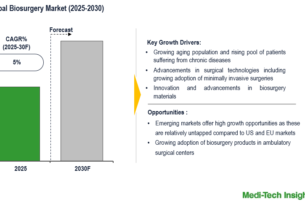
Introduction
The global herbal medicinal products market is poised for steady growth in the coming years, supported by a substantial rise in consumer interest in natural, plant-based treatments and complementary therapies. With a projected CAGR of 5–8% during the forecast period, the market is expanding as individuals increasingly seek safe, effective, and holistic alternatives to conventional pharmaceuticals.
Get Free Sample Report: https://meditechinsights.com/herbal-medicinal-products-market/request-sample/
The rising prevalence of lifestyle-related and chronic illnesses has further amplified this shift, pushing consumers to adopt preventive healthcare practices rooted in traditional and herbal medicine. Government initiatives promoting herbal therapeutics, coupled with improved product formulations, are also accelerating market adoption. Although the industry faces hurdles such as inconsistent regulatory frameworks and variations in raw material quality, ongoing innovation and global acceptance of herbal medicine continue to create lucrative prospects for manufacturers and healthcare providers.
Report Overview
The herbal medicinal products market encompasses a diverse spectrum of naturally derived healthcare solutions crafted from plant-based ingredients, botanical extracts, and traditional herbal formulations. These products are commonly used to treat various health conditions, boost immunity, and enhance overall well-being. The market includes dietary supplements, herbal pharmaceuticals, functional foods, medicinal teas, and wellness products formulated to cater to preventive and therapeutic needs. Consumers increasingly rely on herbal medicines not only as alternatives but also as complements to synthetic drugs, driven by perceptions of safety, fewer side effects, and long-term benefits.
Herbal medicinal products are distributed across multiple channels, including over-the-counter (OTC) retail, pharmacy sales, specialty wellness stores, and rapidly growing online platforms. Digital channels, in particular, have reshaped the market by offering greater accessibility, brand variety, and consumer education. As patient preferences shift toward natural solutions supported by traditional systems like Ayurveda, Traditional Chinese Medicine (TCM), and herbal naturopathy, the global herbal market continues to evolve with an expanding base of informed and health-conscious consumers.
Consumer Shift Toward Natural and Organic Products
A major force driving the herbal medicinal products market is the strong and growing consumer shift toward natural, organic, and plant-based solutions. With heightened awareness of the potential long-term side effects of synthetic drugs, consumers are increasingly choosing herbal remedies for everyday health management. The preference for clean-label products, transparency in sourcing, and sustainability is reshaping product development and marketing strategies across the industry. People today are proactively seeking herbal supplements for immunity support, stress management, digestive health, cardiovascular wellness, and skin nourishment, among other benefits.
The global movement toward organic living and minimal chemical exposure has also boosted the adoption of herbal medicinal products. The surge in plant-based diets, vegan lifestyles, and wellness-focused consumption patterns further fuels demand for botanical ingredients. Additionally, consumers across different age groups—from millennials prioritizing preventive health to older adults looking for safe chronic care options—are embracing herbal therapies. Certifications such as organic labels and Good Manufacturing Practice (GMP) compliance play a crucial role in gaining customer trust, making quality consistency and transparency vital for companies aiming to remain competitive.
Technological Innovations Transforming Herbal Medicine
Rapid technological evolution is redefining the capabilities, safety, and effectiveness of herbal medicinal products. Traditional herbal systems, once reliant solely on ancient knowledge, are now supported by advanced scientific tools that validate their therapeutic properties and improve formulation accuracy. New-age extraction technologies like supercritical fluid extraction, microwave-assisted extraction, and cold-press processing enhance the purity, potency, and stability of herbal actives. These methods help preserve bioactive compounds, increase shelf life, and reduce degradation caused by heat or oxidation.
Furthermore, advanced delivery technologies such as nanoencapsulation, liposomal systems, and controlled-release formulations significantly boost the bioavailability of herbal ingredients. These innovative techniques enable nutrients and botanical actives to be absorbed more efficiently, improving their therapeutic outcomes. Analytical technologies like HPLC, gas chromatography, and mass spectrometry allow manufacturers to authenticate ingredients, standardize potency, and maintain uniformity across product batches.
Artificial intelligence is also emerging as a powerful tool in the herbal medicine landscape. AI-driven analytics can identify promising plant compounds, optimize cultivation practices, and predict consumer trends. Combined with sustainable farming methods and biotechnology, these advancements reinforce the credibility of herbal medicinal products and position them as reliable components of mainstream healthcare.
Competitive Landscape Analysis: Herbal Medicinal Products Market
The competitive landscape of the herbal medicinal products market includes a blend of long-established companies, traditional medicine brands, and new entrants focused on innovation and wellness. Many companies are investing in R&D to formulate herbal products backed by scientific validation and quality certifications. Strategic collaborations between herbal product manufacturers, biotechnology companies, and healthcare providers are also emerging, enabling more comprehensive health solutions that combine traditional insights with modern science.
Geographic expansion remains a key strategy for market players seeking to tap into regions with strong herbal traditions, such as Asia-Pacific, as well as Western markets experiencing rising demand for clean-label and nature-based health products. Companies are also leveraging social media, influencer marketing, and e-commerce platforms to strengthen brand visibility and engage directly with health-conscious consumers.
Market Drivers
Rising consumer preference for natural remedies
Growing prevalence of chronic diseases and lifestyle disorders
Advancements in herbal product formulation and delivery technologies
Increasing OTC and e-commerce availability of herbal medicinal products
Integration of herbal therapies into modern healthcare systems
Attractive Opportunities
Collaborations between herbal medicine and synthetic drug manufacturers
Expansion into emerging markets with strong traditional medicine foundations
Key Players
• Blackmores Limited
• Arkopharma SA
• Better Being Co. (Nutraceutical Corporation)
• STADA Arzneimittel AG
• Himalaya Global Holdings Ltd
• Integria Healthcare
• Boiron Group
• Young Living Essential Oils
• Mountain Rose Herbs
Key Request a free sample copy or view report summary: https://meditechinsights.com/herbal-medicinal-products-market/request-sample/
About Medi-Tech Insights
Medi-Tech Insights is a healthcare-focused business research & insights firm. Our clients include Fortune 500 companies, blue-chip investors & hyper-growth start-ups. We have completed 100+ projects in Digital Health, Healthcare IT, Medical Technology, Medical Devices & Pharma Services in the areas of market assessments, due diligence, competitive intelligence, market sizing and forecasting, pricing analysis & go-to-market strategy. Our methodology includes rigorous secondary research combined with deep-dive interviews with industry-leading CXO, VPs, and key demand/supply side decision-makers.


